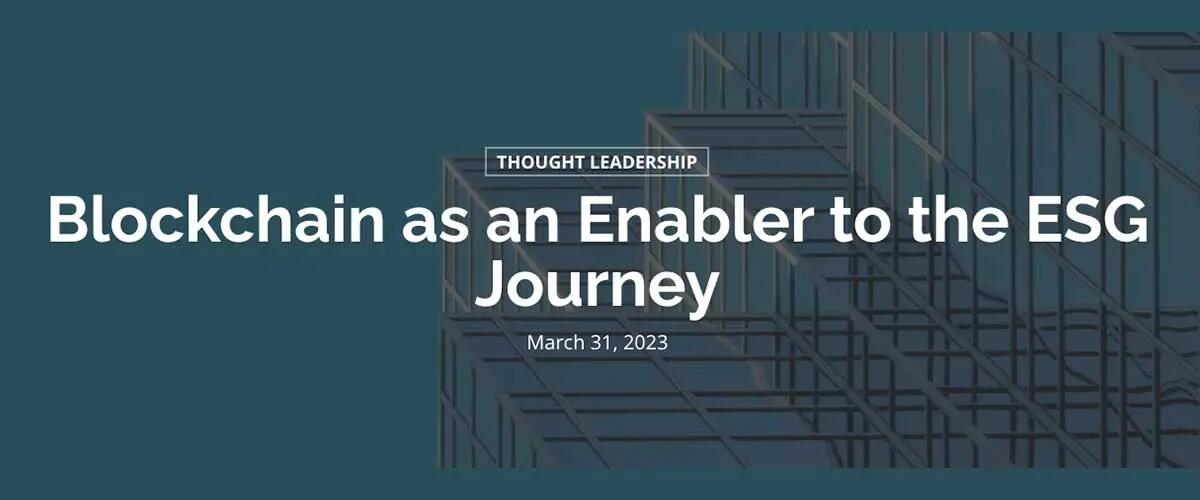
blockapps
Thought Leadership: Blockchain as an Enabler to the ESG Journey
This article by, Rutgers Business School Professor John Impellizzeri and Chase Denecke, Technical Writer at Blockapps was originally published on Blockapps, on March 31, 2023.
A little over one year ago, in March 2022, the Securities and Exchange Commission (SEC) announced a plan called "The Enhancement and Standardization of Climate-Related Disclosures for Investors" to introduce mandatory climate disclosures for reporting organizations as a new legal ESG (environmental social governance) standard. The goal of these new disclosures is to provide consistency and standardization to what was already a growing trend by many public companies in providing sustainability reporting to its stakeholders.
The proposed extensive disclosures will most certainly require significant time, resources, and technology investments for companies to properly respond to the mandated compliance.
The intention is that these new rules will apply to all publicly-listed SEC reporting companies, however the initial focus will be on what the SEC defines as large accelerated filers, which are publicly traded companies with a market cap above $700 million.
For large companies, the SEC's initial climate disclosure requirements will begin in 2023, however we are expecting a final decision on the disclosure timetable to be made in April 2023. Smaller companies have until 2025 before they need to be in compliance.
Under the current proposal, affected organizations will need to report in 2023 the following:
- Materiality outlook to select material ESG topics, risks, and focus areas
- Details on how the board and management exercise their oversight and set climate-related targets and goals
- Sustainability and ESG performance targets, goals, and progress
- Sustainability and environmental risks affecting the company ○ How sustainability and ESG risks are or could impact operating results, financial performance, and shareholder value
- Scope 1-2 GHG disclosure (scope 3 will likely be delayed one year)
- Any ESG or climate analytics tools, such as scenario analysis, the registrant uses to assess the impact of climate-related risks on its business and consolidated financial statements.
- Relevant information on an organization's use of carbon offsets, credits, and/or renewable energy credits or certificates (RECs) as part of the company's overall net emissions reduction strategy
Additionally, the proposed rules require large companies to include an attestation report from a trusted and experienced third party, covering , at a minimum, the disclosure of the company’s scope 1 and 2 emissions.
Companies that excel at implementing ESG requirements may be able to offset most or all of these costs via benefits to the following aspects of their business:
- Brand Reputation
- Talent Attraction and retention
- Enhance trust with stakeholders
- Premium pricing
- Increased efficiencies and ROI
Blockchain is an essential component of a broader ESG strategy
Perhaps the single biggest concern for all affected filers is secure, traceable and trusted data. Companies are rightly concerned that the availability and quality of disclosure requirements (like level GHG emissions) are a monumental challenge.
What is clear to all is that the SEC intention is not a “check the box” exercise. Companies need to integrate their broader strategy to align with its sustainability priorities and requisite disclosures. No doubt an investment in technology is one of the pillars to assure availability, transparency and assurance of quality in reporting.
Blockchain technology can be a big part of the solution and be the enabler to overcome the anticipated hurdles. How can investors, analysts and regulators trust what is being reported? Blockchain can provide trusted and immutable certification for an array of critical data points that relate to an organization’s ESG targets.
By leveraging blockchain technology, companies can ensure transparency, security, and trust in their ESG data. Blockchain's decentralized nature allows for the creation of an immutable, tamper-proof record of information, making it an ideal solution for tracking and verifying ESG-related activities and progress. For instance, blockchain can be used to monitor carbon emissions, trace the origin of materials in supply chains, or even verify the authenticity of renewable energy certificates. By implementing blockchain solutions, companies can mitigate the risk of fraudulent or inaccurate reporting, ensuring that stakeholders have access to reliable and trustworthy information.
Moreover, blockchain-based platforms can facilitate collaboration between stakeholders and streamline the ESG reporting process. These platforms can serve as a single source of truth, where organizations can securely share and access verified ESG data in real-time. This can help eliminate redundancies and inconsistencies in data management, significantly reducing the time and resources required for compliance. Furthermore, blockchain's smart contract capabilities can be utilized to automate various aspects of ESG reporting, such as triggering notifications when specific milestones are reached or when data is updated. This increased efficiency can enable companies to focus on their core sustainability objectives, while also providing a more accurate and comprehensive picture of their ESG performance.
In the long run, adopting blockchain technology in ESG reporting can create a more resilient and sustainable business ecosystem. As companies become more transparent and accountable, investors, regulators, and other stakeholders will be better equipped to evaluate their ESG performance and make informed decisions. This heightened level of trust can lead to increased investments in companies that demonstrate strong ESG practices, driving a shift towards more sustainable business models. By embracing blockchain technology as an enabler in their ESG journey, organizations can not only comply with regulatory requirements but also foster a culture of sustainability and responsible business practices that ultimately benefits society as a whole.
Press: For all media inquiries see our Media Kit


